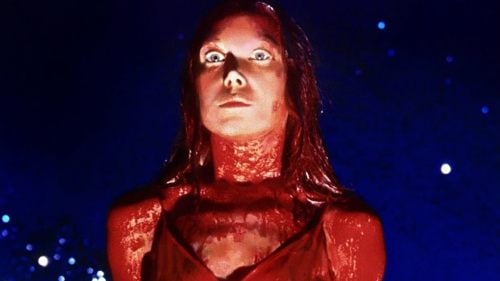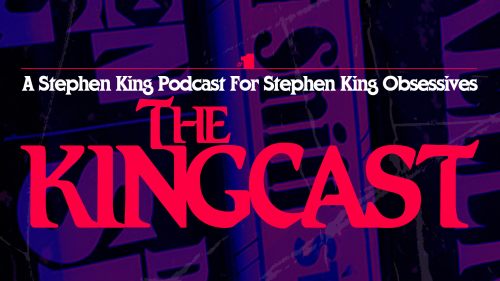CASTLE ROCK Review: “Habeas Corpus” + “Local Color”
Note: This post contains spoilers for Castle Rock.
"People think we're just one of those dead towns they heard about: a run of bad luck, worse judgement, broken promises. We know different, don't we? It's not luck. It's a plan...and not God's, either. Remember the dog? The Strangler? Sure you do. How 'bout all the others that didn't make headlines? Take any house in this town. Hell, take mine. Every inch is stained with someone's sin. I lie awake at night, thinking about all the blood spilled under my roof alone. People say 'it wasn't me...it was this place.' And the thing is: they're right."
Previously on BMD's coverage of Castle Rock: we saw the pilot episode (titled "Severance") at San Diego Comic-Con and were instantly hooked. The story of death row human rights attorney Henry Deaver (André Holland) returning to Stephen King's iconic, titular town – where Henry may have killed his father as a boy before disappearing into the woods for eleven days – seemed to be applying Executive Producer JJ Abrams' "mystery box" modus operandi to the horror master's working class Maine universe. Toss in a cryptic Terry O'Quinn (as Shawshank Prison warden Dale Lacy) driving his car over a cliff into Dark Score Lake, and a mysterious, emaciated mute prisoner (Bill Skarsgård) discovered in a secret cell buried beneath an abandoned block, and suddenly you have a whole novel’s worth of spooky set up contained in the show’s initial hour.
"Born down in a dead man's town." That Bruce Springsteen quote precedes the very first chapter of Stephen King's IT, and even though that ghastly epic – about an ancient evil whose presence has festered and fed off all the iniquity that inhabits the quiet hamlet of Derry – didn't take place in the same locale as Castle Rock, the thematic through-line (not to mention narrative prologue) remains the same. Henry is called back to the old stomping grounds he thought he'd left behind long ago, thanks to a mysterious phone call (only this one comes from a stranger, instead of his childhood best friend). Now, it's possibly his job to defend the humanity of this outlandish, seemingly abused man (Skarsgård), whom the system caged and then tossed away the key.
However, the key question posed by Castle Rock's second episode (slyly titled "Habeas Corpus") seems to be: is this boy even a boy at all? Through a series of flashbacks and dead of night chats, we learn that Lacy believes he may have discovered the root of all vice in Castle County, and built that metal hole in the ground in order to keep it locked up for good. Only now that the boy – who could even be "the Devil himself", as former Sheriff Alan Pangborn (Scott Glenn) informs the new Shawshank warden (Ann Cusack) over a $6 Coors – is loose, strange things are afoot in the now possibly haunted prison. The episode begins where “Severance” left off, with plucky guard Dennis Zalewski (Noel Fisher) seemingly hallucinating that the prisoner’s not only made it out of his fresh cell, but killed a few of the corrections officer's colleagues along the way. But that just can't be; and when Zalewski asks the boy about it after collecting his dinner tray – which the mystifying inmate still hasn't touched a bite of – all he gets is a dead-eyed stare in response (side note: Skarsgård seems to have been born to play ancient subterranean menaces in Stephen King stories).
Meanwhile, Henry finds that he can't run from the local lore surrounding him, as Dale Lacy's blind widow, Martha (Myra Turley), tosses him out while threatening to call the cops once she discovers his identity (thus preventing the lawyer from further exploring why the Lacys keep their basement padlocked). On the opposite end of the spectrum, his adopted father's young religious successor (Mad Men's Aaron Staton) tells Deaver he's delighted to meet a man who represents "redemption in the flesh", before one of the pastor’s congregation (Jane Levy – playing a character named [ugh] Jackie Torrance) details how Henry's living urban legend even inspired children’s Halloween costumes one year (before an Instagram photo made its way online, complete with blackface, and became a whole "thing"). The only person seemingly ready to welcome Castle Rock's "boy who lived" back is Henry's mother, Ruth (Sissy Spacek), and that's possibly because her dementia prevents her from recalling the uglier moments of their domestic history. Because for Castle Rock, Henry may be the biggest enigma of all: the troubled black man who seemingly ran from his white parent’s death, got lost in the woods during a record snowfall, and then claimed to have no memory of any of it.
Episode three ("Local Color") develops Castle Rock's most prominent side-player who, up until this hour, was really only lurking on the story's periphery. Molly Strand (Melanie Lynskey) is a Rock lifer – or “Mainiac”, as she refers to herself on the area’s news broadcast – whose pet project is launching a downtown revitalization (by mortgaging her mother's house). In essence, she hopes to combat the economic depression and architectural decay that set in once her hometown disincorporated (and literally disappeared from the map), driving businesses away. She also suffers from psychic visions that she attempts to suppress with illegally purchased painkillers, and may have had a hand in the death of her next door neighbor Henry Deaver's adopted father when they were kids. If you've ever read a Stephen King book, she's the quintessential screen embodiment of his female characters: tenacious, barely holding it together, and cursed by a "gift" she cannot fully control.
Together, Holland and Lynskey (not to mention Lost alumnus O'Quinn), help Castle Rock own an air of class that helps viewers buy into this loose spin-off from King's blue-collar prose. Holland is all restless side-eyes and anxious repression, desperately hoping to solve this riddle (even if it means joining a prayer group to infiltrate Shawshank prison). Henry wants to get the hell out of Dodge before these white New Englanders lock his black ass up (his skin color often commented upon, lending the show a sly political subtext about America's "forgotten" Caucasian strongholds). Lynskey is stellar as usual, and just as bottled as her co-star. However, we get the feeling that if Molly’s true power were unleashed, there'd be a heap of cosmic suffering that's unveiled and acted upon. Their brief scenes together in "Local Color" are stellar and laced with the sexual chemistry of a missed connection; possible first love that never blossomed, due to the malevolence that breeds in the place they unfortunately call home.
But which of these haunted men and women are the true "defenders" of Castle Rock (as Lacy's suicide note to Pangborn so elegantly labels them)? And what exactly does the town require defending from? Lacy cryptically tells us (via the V.O. in "Habeas Corpus") that there have been hidden warriors in Castle Rock for years, trying to keep the darkness at bay. Along those same lines, why does Molly continue to have nightmares about Henry's dad, bandaged and screaming about "God's plan" and how she interfered with it? As far as "mystery boxes" go, this one is jammed until the lock's about to pop off. Hopefully, Abrams – along with showrunners Dustin Thomason and Sam Shaw – solve a few of these instead of leaving them open ended (as the EP has been notorious for in the past), so that Castle Rock isn't slavishly faithful up to and including King's worst writerly attribute: not being able to stick the landing.
Castle Rock's pilot ("Severance"), "Habeas Corpus" and "Local Color" are all available today to stream on Hulu.



